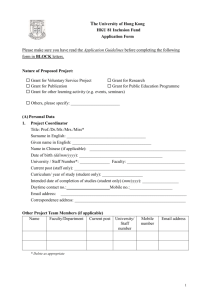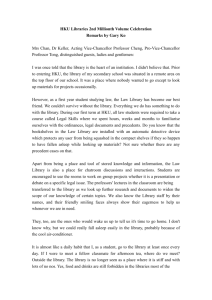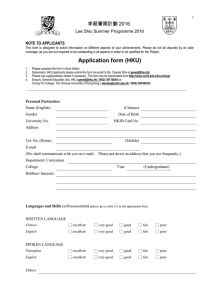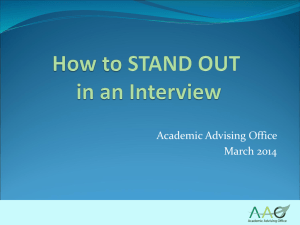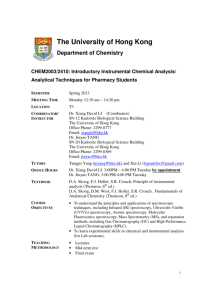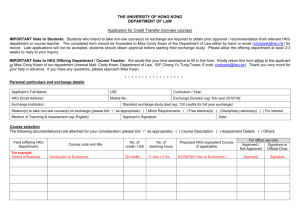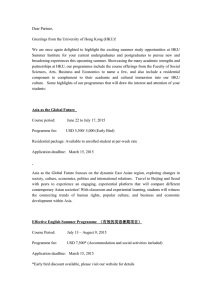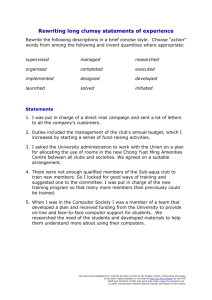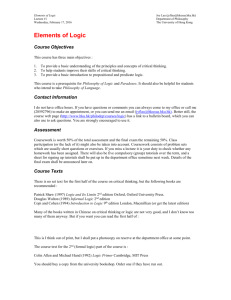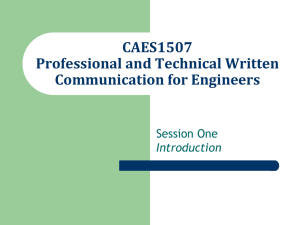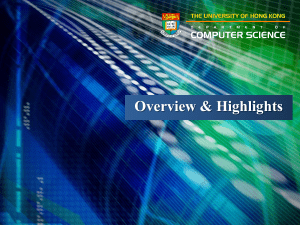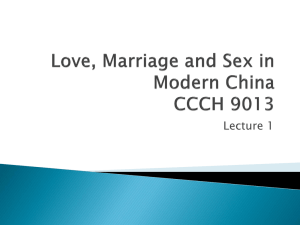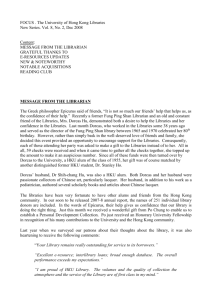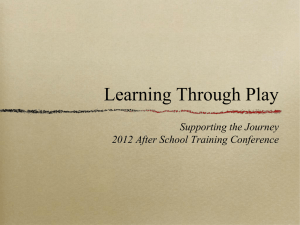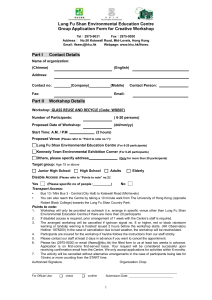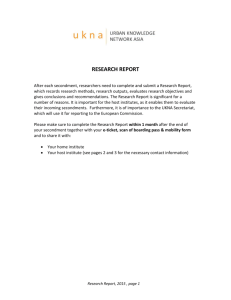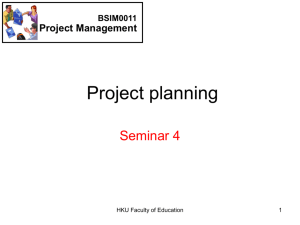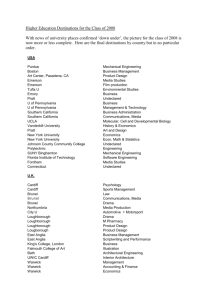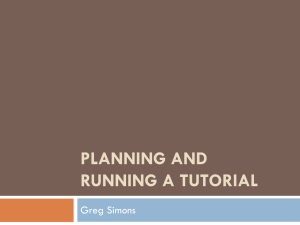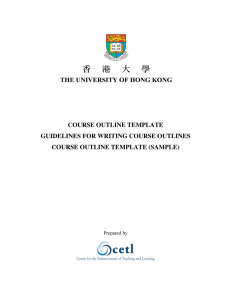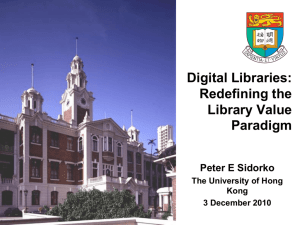Innovation in Engineering and Science Education
advertisement
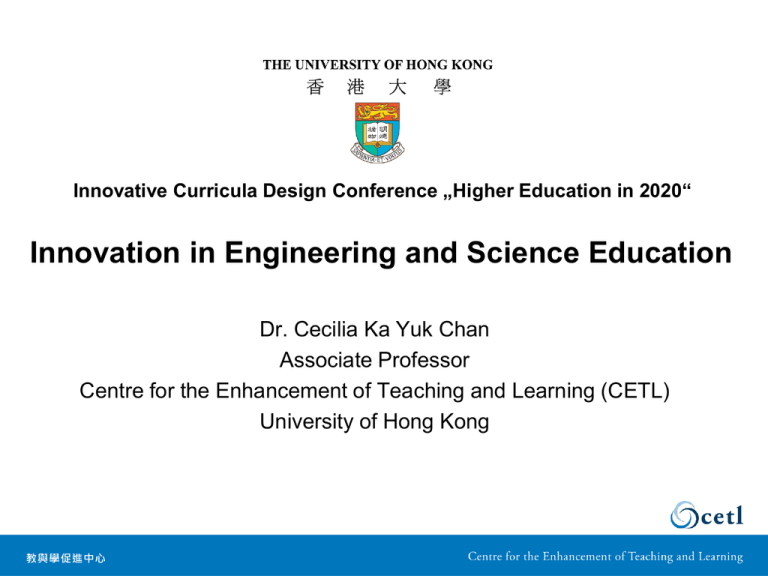
Innovative Curricula Design Conference „Higher Education in 2020“ Innovation in Engineering and Science Education Dr. Cecilia Ka Yuk Chan Associate Professor Centre for the Enhancement of Teaching and Learning (CETL) University of Hong Kong Tere hommikust. Meeldiv kohtuda Ma ei räägi “palju” eesti keelt. Think Out of the Box Puzzle Pretend that the above is drawn on a piece of paper, draw 4 straight lines with an imaginary pen without lifting up the pen so that the lines go through all the dots using only 4 lines. How can it be done? My Life - From Engineering to Education • Bachelor – Mechanical Engineering and Mathematics – Trinity College Dublin • PhD – DSP, Computer Vision – Trinity College Dublin • Researcher/Software Consultant in Industry • Lecturer and an Assistant Head in Engineering • Postgraduate Dip. and MA in Higher Education • Associate Professor in Centre for the Enhancement of Teaching and Learning • Fellow in King’s College London • Education Research (esp. Science and Engineering) 4 Research Vs Teaching TEACHING RESEARCH Tenure and Promotion University of Hong Kong World Rankings 2013 – 2014 (No. 43) 2008 – 2009 (No. 18) 2013 – 2014 (No. 26) Engineers and Scientists Perception How can you do “active learning” in mathematics? PBL, isn’t that what we have been doing for the last 20 years with our student projects? That just won’t work in engineering We can’t afford to spend time to teach them skills that are unrelated to the core subjects? Student retention, motivation, engagement, learning, blah!! Overview: Primary Issues in Engineering and Science Education • • • • • • • Student Retention Student Recruitment (Quality Vs Quantity) Pedagogy – active learning Assessment Generic skills/Global competence Student Motivation and Engagement Internationalization Active Learning Why plan for ‘Active’ Lectures? Problem of Attention span Psychological constraints on learning: Concentration drops with sustained and unchanging low level activity (such as sitting and listening), but to follow lecture content concentrated effort is required. 10 – 15 mins Students attention is typically maintained for _____________ minutes??? English: How are you? Chinese: 你好吗? Pinyin : Nǐ hǎo ma? Two ways to tackle some of the issues • Common Core Curriculum • Experiential Learning and “out of classroom” Learning HKU Common Core Curriculum - Goals 1. To enable students to have a broader perspective and a critical understanding of the complexities and interconnectedness of the problems and issues that they are confronted within their everyday lives; 2. To enable students to have a deeper understanding of their own cultures and other cultures, and to appreciate the interrelatedness and diversity among cultures; 3. To enable students to see themselves as members of local as well as global communities and to play an active role as responsible individuals and citizens in these communities; 4. To enable students to develop the key intellectual skills that will be further enhanced in their disciplinary studies. HKU Common Core Curriculum - There are 4 main area of inquiry: The Humanities 39 Scientific and Technological Literacy 44 Global Issues 37 China: Culture, State and Society 37 How do the students learn? Diverse modes of learning: • participative and experiential nature of learning • case-based learning, inquiry-based learning, problem based learning, action-based learning, small group learning, etc. • to enable students to engage in collaborative work, provide leadership in team work, conduct critical analysis, see things from different perspectives, make informed decisions How are students being assessed? Diverse modes of assessment. • Keeping a journal to reflect on lectures and readings • Making a movie • Engaging in fieldwork • Undertaking research • Constructing a website • Doing group projects and presentations. 15 A Common Core Course https://www.youtube.com/watch?v=seazn3xp704 16 Experiential Learning @ HKU I hear and I forget. I see and I remember. I do and I understand. – Confucius (Chinese Philosopher) Forms of Experiential Learning • • • • • • • Cooperative education placements Practicum experiences Classroom-based hands-on laboratory activities Field studies Exchange studies Community service learning Many more.. This bottom-up initiative has been made as one of the common learning experiences in the 4-year curriculum. Bringing the real project into classroom • Through planning, design, management of construction and until completion of a real project, students gain a sense of ownership and satisfaction of the project • Improvement in communication skill when meeting with people from different social and cultural backgrounds • Promotion of teamwork and multidisciplinary cooperation Project Mingde https://www.youtube.com/watch?v=HdjxqO07sTM 20 • http://hke3r.cetl.hku.hk/ In order to motivate our student, we need to motivate ourselves first Students are the seeds of today and are the crops of the future Thank You Thank you for your participation!!! If you wish to contact me for further information Email: Cecilia.Chan@cetl.hku.hk Phone: +852 3917 8534 Answer to the riddle
